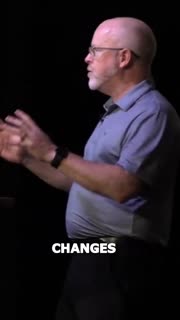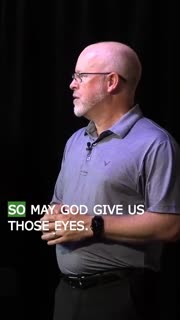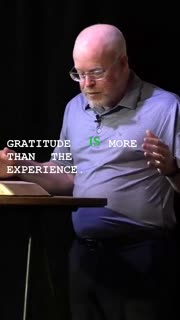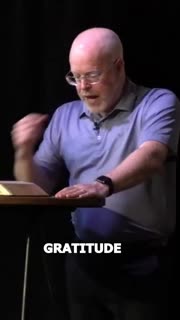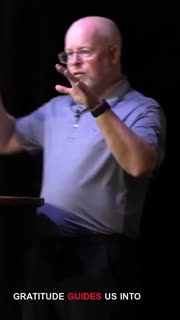Embracing Gratitude: Finding Joy in Every Circumstance
Devotional
Sermon Summary
Bible Study Guide
Sermon Clips
### Quotes for Outreach
1. "Gratitude changes the way that we see the world. It's the lens and the glasses that we put on. It brings everything into clarity. If I right now take my glasses off, I have no idea who y'all are. I know from sitting, I know Roger's gonna be up here because he always is. I know the Embrys will be over there. I know back there are the Kudas. I know. I can tell, but I cannot make out the features of your face. I see things blurly. I can't see them clearly. But if I look through these lenses, it transforms everything. It makes everything crisp and clean." [35:16] (45 seconds)
2. "Gratitude brings light to anything, to all things. It gives focus. It makes things crisp. You can see things for what they really are, not simply the shape of them or a blurry substitute. When we think about Paul's words, in and not for, it's because he knows that gratitude is best." [36:57] (31 seconds)
3. "Gratitude is something that helps us see what is, not what isn't. And instead of focusing on the negative, it helps us to see the positive, to look for the good in people. And it's not some sort of self-deception in which we are just kidding ourselves about people. But it's seeing them as God sees them and seeing the good in them and choosing to focus on that." [44:51] (26 seconds)
4. "Gratitude guides us into the sort of life that produces fruitfulness and disciples for the kingdom of God. It shapes how we see the world and it's the heart of celebration. And ministry. Part if not all of the reason that we gather on this day and that we lift up praises and that we set aside this time is because of the gratitude we feel to God for what he's done in our life." [46:41] (30 seconds)
5. "Why should we be grateful? Well, first, because of all that God has done for us. And second, if we want to see the world through the eyes of the kingdom of God, we must be a people of gratitude. So may God give us those eyes." [01:12:16] (343 seconds)
### Quotes for Members
1. "Gratitude is more than the experience. Occasional thanks be to God. It's an attitude that enables us, listen carefully to this, to let go of anger. To receive the hidden gifts of those we want to serve. And make these gifts visible to the community as a source of celebration. What does that mean? That means it helps us to let go of the resentment that we have because we think we're owed something that we may or may not be owed. It helps us to have an attitude that seeks to put other people in the front that doesn't need the attention, that doesn't need the accolades. But instead it's to help them develop their gifts to benefit the body of Christ." [45:54] (47 seconds)
2. "Gratitude takes us to that place. If we were to give it a definition, Alan says it like this. Gratitude is more than the experience. Occasional thanks be to God. It's an attitude that enables us, listen carefully to this, to let go of anger. To receive the hidden gifts of those we want to serve. And make these gifts visible to the community as a source of celebration." [45:54] (47 seconds)
3. "Gratitude guides us into the sort of life that produces fruitfulness and disciples for the kingdom of God. It shapes how we see the world and it's the heart of celebration. And ministry. Part if not all of the reason that we gather on this day and that we lift up praises and that we set aside this time is because of the gratitude we feel to God for what he's done in our life. There are people among us who've been redeemed from addiction, who are being redeemed from addiction, who have broken past, who have terrible families, who have horrible marriages that they've come out of, who have difficulties in homes. And God has. Redeemed or is redeeming all of those things." [46:41] (30 seconds)
4. "Gratitude is a discipline that has to be cultivated and practiced. It's easy. It requires very little effort to be resentful. But it takes a close look into the soul. It takes moments where you. Search your heart. It takes a daily habit of recognizing these things. To cultivate a life of gratitude. It takes a lot. But when we do that, it changes the way we see everything. And instead of obstacles and difficulties and things, we see opportunities. We see ways where we can give back." [52:21] (45 seconds)
5. "If you want to honor what God has done, if you want to give thanks for the tremendous gifts and privileges that we have in the stations that we are in life, then use those gifts and resources, use those privileges to help other people. That's how you say thank you. That's how you walk with God and not feel guilty about what God has given you. That your responsibility and mine. My responsibility is to share those things with people that do not have them. In whatever ways we can. In all the circumstances of life that we can. That's the call to us. To live and enjoy God's blessing on our lives. And to take that and use it for other people's benefit." [51:14] (55 seconds)
Ask a question about this sermon
1. "Gratitude changes the way that we see the world. It's the lens and the glasses that we put on. It brings everything into clarity. If I right now take my glasses off, I have no idea who y'all are. I know from sitting, I know Roger's gonna be up here because he always is. I know the Embrys will be over there. I know back there are the Kudas. I know. I can tell, but I cannot make out the features of your face. I see things blurly. I can't see them clearly. But if I look through these lenses, it transforms everything. It makes everything crisp and clean." [35:16] (45 seconds)
2. "Gratitude brings light to anything, to all things. It gives focus. It makes things crisp. You can see things for what they really are, not simply the shape of them or a blurry substitute. When we think about Paul's words, in and not for, it's because he knows that gratitude is best." [36:57] (31 seconds)
3. "Gratitude is something that helps us see what is, not what isn't. And instead of focusing on the negative, it helps us to see the positive, to look for the good in people. And it's not some sort of self-deception in which we are just kidding ourselves about people. But it's seeing them as God sees them and seeing the good in them and choosing to focus on that." [44:51] (26 seconds)
4. "Gratitude guides us into the sort of life that produces fruitfulness and disciples for the kingdom of God. It shapes how we see the world and it's the heart of celebration. And ministry. Part if not all of the reason that we gather on this day and that we lift up praises and that we set aside this time is because of the gratitude we feel to God for what he's done in our life." [46:41] (30 seconds)
5. "Why should we be grateful? Well, first, because of all that God has done for us. And second, if we want to see the world through the eyes of the kingdom of God, we must be a people of gratitude. So may God give us those eyes." [01:12:16] (343 seconds)
### Quotes for Members
1. "Gratitude is more than the experience. Occasional thanks be to God. It's an attitude that enables us, listen carefully to this, to let go of anger. To receive the hidden gifts of those we want to serve. And make these gifts visible to the community as a source of celebration. What does that mean? That means it helps us to let go of the resentment that we have because we think we're owed something that we may or may not be owed. It helps us to have an attitude that seeks to put other people in the front that doesn't need the attention, that doesn't need the accolades. But instead it's to help them develop their gifts to benefit the body of Christ." [45:54] (47 seconds)
2. "Gratitude takes us to that place. If we were to give it a definition, Alan says it like this. Gratitude is more than the experience. Occasional thanks be to God. It's an attitude that enables us, listen carefully to this, to let go of anger. To receive the hidden gifts of those we want to serve. And make these gifts visible to the community as a source of celebration." [45:54] (47 seconds)
3. "Gratitude guides us into the sort of life that produces fruitfulness and disciples for the kingdom of God. It shapes how we see the world and it's the heart of celebration. And ministry. Part if not all of the reason that we gather on this day and that we lift up praises and that we set aside this time is because of the gratitude we feel to God for what he's done in our life. There are people among us who've been redeemed from addiction, who are being redeemed from addiction, who have broken past, who have terrible families, who have horrible marriages that they've come out of, who have difficulties in homes. And God has. Redeemed or is redeeming all of those things." [46:41] (30 seconds)
4. "Gratitude is a discipline that has to be cultivated and practiced. It's easy. It requires very little effort to be resentful. But it takes a close look into the soul. It takes moments where you. Search your heart. It takes a daily habit of recognizing these things. To cultivate a life of gratitude. It takes a lot. But when we do that, it changes the way we see everything. And instead of obstacles and difficulties and things, we see opportunities. We see ways where we can give back." [52:21] (45 seconds)
5. "If you want to honor what God has done, if you want to give thanks for the tremendous gifts and privileges that we have in the stations that we are in life, then use those gifts and resources, use those privileges to help other people. That's how you say thank you. That's how you walk with God and not feel guilty about what God has given you. That your responsibility and mine. My responsibility is to share those things with people that do not have them. In whatever ways we can. In all the circumstances of life that we can. That's the call to us. To live and enjoy God's blessing on our lives. And to take that and use it for other people's benefit." [51:14] (55 seconds)
